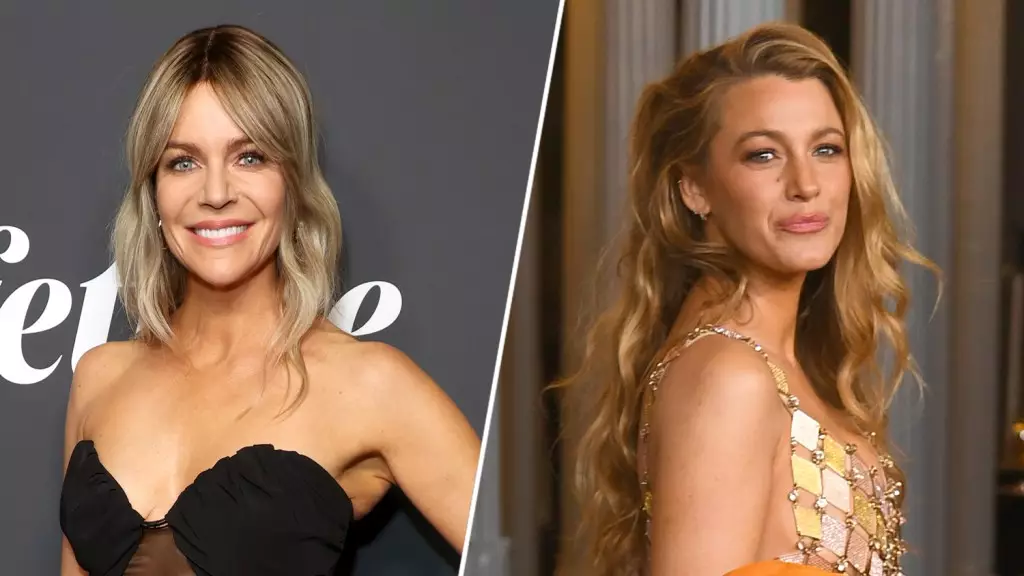In a shocking turn of events, actress Blake Lively has leveled serious accusations against Justin Baldoni, the director and co-star of *It Ends with Us*. This situation has ignited a complex dialogue about workplace harassment and the repercussions faced by those who dare to speak out. Following Lively’s public denunciation of Baldoni, which includes allegations of sexual harassment and attacks on her character, support for her has emerged prominently within Hollywood. One notable figure voicing solidarity is Kaitlin Olson, an Emmy-nominated actress known for her role in *It’s Always Sunny in Philadelphia*. Olson’s public support solidifies Lively’s position in a case that not only underscores the personal impact of harassment allegations but also reveals the intricate web of relationships and business ties among industry professionals.
Olson took to social media to express her admiration for Lively, emphasizing her character and strength as both an actress and a mother. Such open endorsements from peers highlight the cultural shift towards supporting those who come forward with allegations of misconduct. The entertainment industry has long been scrutinized for its treatment of accusations concerning sexual harassment, leading to a crucial moment where individuals are emboldened to share their stories, challenging the status quo.
Lively’s allegations against Baldoni detail a “hostile work environment” that allegedly placed a significant strain on the production of their film. The comprehensive 80-page complaint filed with the California Civil Rights Department paints a vivid picture of an organized effort—involving digital manipulation and public relations tactics—targeted at silencing her. Lively condemned what she describes as a “coordinated effort to destroy her reputation,” indicating a troubling reality faced by many women in similar circumstances.
Notably, Lively has articulated her hope that her legal actions will expose the “sinister retaliatory tactics” often employed to intimidate and harm those who come forward with accusations. This reflects a growing awareness and rejection of systemic silencing, as individuals opt to challenge such behavior through legal channels and public discourse.
In response to Lively’s claims, Baldoni’s legal team has vehemently denied the allegations, labeling them as “completely false” and claiming they are designed to inflict public harm. This mirrors a broader pattern often observed in high-profile cases—where the accused may immediately push back against allegations in an effort to regain control of the narrative. Baldoni’s attorney, Bryan Freedman, has promised that their forthcoming legal action will reveal what they describe as the true story behind the allegations, suggesting that the stakes are far higher than mere reputations; they’re about the very integrity of the narratives constructed by those involved.
Moreover, the dispute has drawn in even more players, including Stephanie Jones, a former PR strategist for Baldoni, who has filed her own lawsuit against him and associated parties for defamation and breach of contract. This entanglement highlights the complex interactions within the industry, where personal relationships and professional ties can complicate situations significantly.
Media Manipulation and the Pursuit of Truth
At the heart of this unfolding drama is a broader issue of media manipulation portraying narratives that can either damage or bolster an individual’s reputation. As Baldoni’s attorney asserts, he aims to expose a “demonstrably false narrative,” alleging that messages have been taken out of context to serve Lively’s claims. This call to focus on “real evidence” resonates with audiences weary of sensationalized media portrayals and eager for transparent accounts.
The implications of this legal battle extend beyond just the parties involved; it symbolizes a critical moment in the entertainment industry where accountability and truth-telling may finally prevail. As Lively’s case continues to unfold, the support she has garnered from colleagues like Olson serves as a reminder that solidarity can play a crucial role in healing and paving the way for systemic change, influencing both public perception and institutional policies governing workplace conduct.
The legal disputes between Lively and Baldoni echo a larger narrative about the struggle for integrity within the entertainment industry, urging spectators to remain discerning as they navigate the converging paths of truth, power, and justice in contemporary society.

